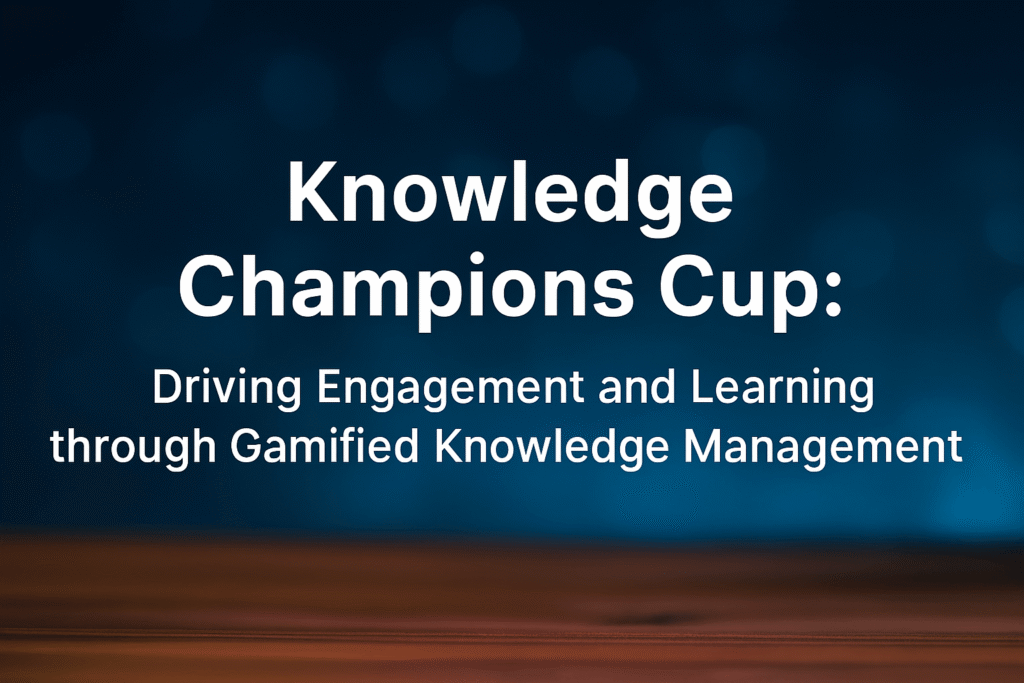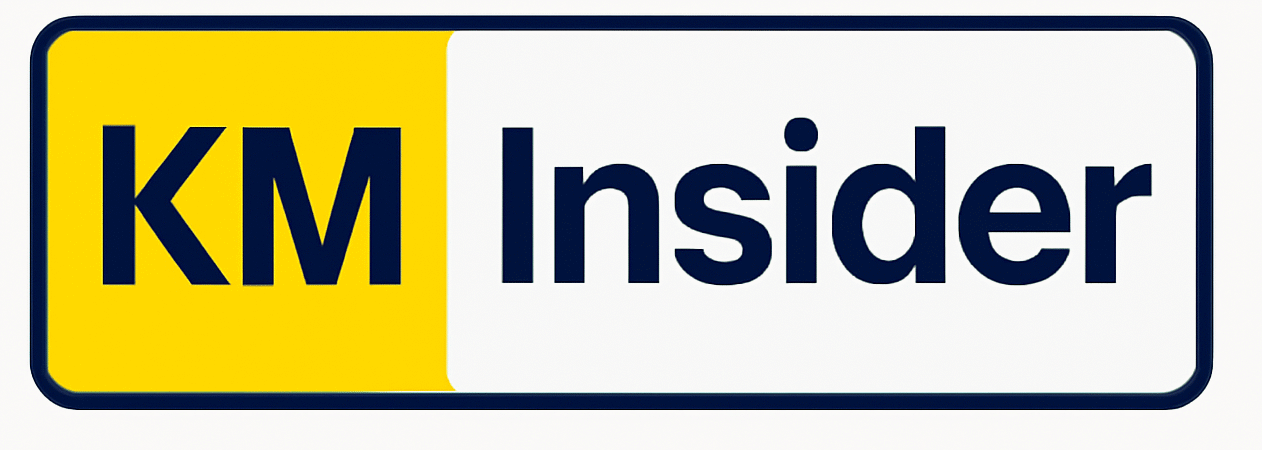In today’s rapidly evolving business landscape, knowledge management has emerged as a fundamental enabler of organizational performance and strategic decision-making. Organizations that systematically capture, organize, and leverage knowledge not only enhance operational efficiency but also cultivate a sustainable competitive advantage. However, the successful implementation of KM initiatives often encounters challenges—most notably, fostering genuine employee engagement and active participation in knowledge-sharing and continuous learning processes.
From my experience as a KM consultant, one of the most effective solutions to these challenges is gamification. By integrating game design elements into non-game contexts, gamification creates immersive and motivating experiences that drive participation, reinforce learning behaviors, and strengthen organizational knowledge flows.
This article explores how gamification can be strategically employed to reinforce KM practices and deliver measurable benefits. To illustrate these principles in practice, we introduce the “Knowledge Champions Cup”, a gamification-based project implemented within organizations to stimulate knowledge sharing, enhance collaboration, and instill a culture of continuous learning. This initiative exemplifies how thoughtfully designed gamified experiences can transform abstract KM objectives into tangible, engaging, and results-driven organizational outcomes.

What is Gamification?
Gamification refers to the application of game elements and mechanics in non-game contexts to create engaging and interactive experiences. Its primary objective is to enhance user motivation and participation. This approach is widely used across education, marketing, project management, and organizational performance improvement. Common game elements—such as scoring, badges, levels, challenges, and leaderboards—are designed to evoke a sense of competition and achievement, encouraging users to continue participating in activities that might otherwise seem routine.
In organizational settings, gamification can boost employee engagement in training, skill development, and knowledge-sharing initiatives. By integrating playfulness into everyday tasks, gamification transforms routine processes into motivating and rewarding experiences.
Over the past two decades, gamification has proven to be an effective organizational tool, enhancing engagement, motivation, and productivity. Today, many organizations continue to leverage gamification to drive performance and foster active participation in critical activities.
The impact of gamification on knowledge management
Gamification can significantly influence knowledge management (KM) by enhancing processes related to the collection, organization, and sharing of knowledge. Its application in KM brings multiple benefits, including the following:
- Increased Motivation and Participation: One of the most notable impacts of gamification on KM is its ability to boost user engagement. By incorporating elements such as scoring, badges, and levels, gamification encourages individuals to actively participate in knowledge-related activities. For instance, users may earn points for sharing insights or completing educational tasks, progressing to higher levels. These rewards foster a sense of achievement and friendly competition, further motivating continued participation.
- Enhanced Communication and Collaboration: Gamified environments can facilitate collaboration and interaction among employees. When users compete or cooperate to complete challenges, their communication and teamwork naturally increase. This interaction not only promotes knowledge sharing but also broadens organizational knowledge, enabling employees to leverage each other’s expertise to solve problems more efficiently within a dynamic and motivating collaborative environment.
- Improved Learning and Skill Development: Gamification can transform training and skill-building initiatives into engaging, interactive experiences. By structuring learning activities as challenges or missions, KM can deliver organizational knowledge and skills more effectively. This approach enhances focus, accelerates knowledge acquisition, and provides immediate, actionable feedback, allowing users to monitor their performance and improve continuously.
- Stronger Ownership and Commitment: Active participation in gamified KM initiatives can cultivate a sense of ownership and responsibility among employees. When individuals are rewarded for sharing knowledge, they develop a deeper connection to organizational knowledge and feel more committed to its maintenance and growth. This sense of ownership encourages more serious and consistent contributions, strengthening the overall KM culture within the organization.
gamification serves as a powerful tool to reinforce KM practices by driving engagement, collaboration, learning, and ownership, ultimately fostering a more dynamic and effective knowledge-sharing culture.
Knowledge Champions Cup: A Successful Gamified Knowledge Management Approach
Since 2018, Dana Knowledge Management Consultant Group, a specialized firm in knowledge management, has leveraged gamification to enhance engagement and learning within organizations. One of its flagship initiatives is the “Knowledge Champions Cup,” a gamified competition designed to transform knowledge sharing into an interactive, motivating, and results-driven experience.
The competition begins with participant registration, followed by a lottery stage to create matchups similar to a football league. Each participant presents a unique and impactful experience they have gained, which may include professional achievements, lessons learned from challenges, innovative solutions, or effective practices implemented in their work or personal life. The primary objective of the competition is to create a platform where individuals can deliver tangible value to the organization while simultaneously learning from the collective experiences of others.
Presentations are evaluated by expert judges according to predefined criteria such as innovation, impact, and practicality. Points are awarded based on these criteria, and participants advance through the stages until the top three experiences are selected. Winners are recognized through awards, certificates of appreciation, and in some cases, special opportunities for career growth or professional advancement. This recognition not only celebrates individual achievements but also reinforces a culture of knowledge sharing, learning, and continuous improvement within the organization.
The Knowledge Champions Cup effectively demonstrates how gamification can transform routine knowledge management processes into engaging and meaningful activities. By integrating game elements such as scoring, levels, and challenges, the competition fosters healthy competition, motivation, and active participation. Participants are encouraged to invest effort in preparing presentations, reflecting on their experiences, and applying lessons learned to their work. This creates a cycle of continuous learning, collaboration, and improvement that benefits both individuals and the organization.
Beyond competition, the initiative serves as a dynamic platform for peer inspiration and learning. Participants can observe best practices, innovative approaches, and problem-solving strategies from colleagues across different departments. This exchange of ideas strengthens individual knowledge, enhances organizational intelligence, and makes the organization more capable, innovative, and agile.
the Knowledge Champions Cup goes beyond a simple competition; it is a strategic gamified knowledge management initiative that combines motivation, engagement, and learning in a structured, interactive format, turning knowledge sharing into a purposeful and enjoyable experience. By doing so, it demonstrates how gamification can enhance employee participation, knowledge creation, and organizational development in a sustainable and measurable way.
Gamification as a Strategic Tool in Knowledge Management
From my experience as a knowledge management consultant, gamification represents one of the most effective approaches to fostering a dynamic and motivating environment within organizations. By integrating game elements into knowledge management processes, organizations can actively encourage employees to share insights, exchange experiences, and learn from one another in a structured and engaging manner.
Applying gamification in KM initiatives goes beyond superficial incentives; it drives meaningful engagement, strengthens collaboration, and enhances overall productivity. It also serves as a catalyst for innovation, enabling employees to explore creative solutions and contribute to organizational knowledge in a measurable way.
when implemented thoughtfully, gamification allows organizations to leverage employee potential, foster continuous learning, and enhance participation in key initiatives. From a strategic perspective, this approach contributes to the development of a knowledge-driven culture and supports sustainable competitive advantages by ensuring that insights, expertise, and best practices are continuously captured, shared, and applied across the organization.

